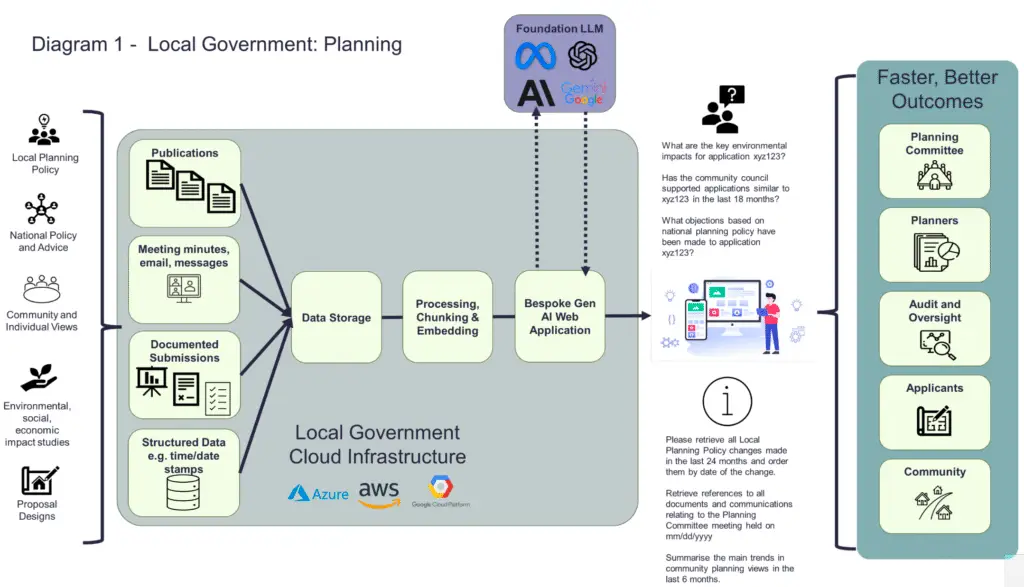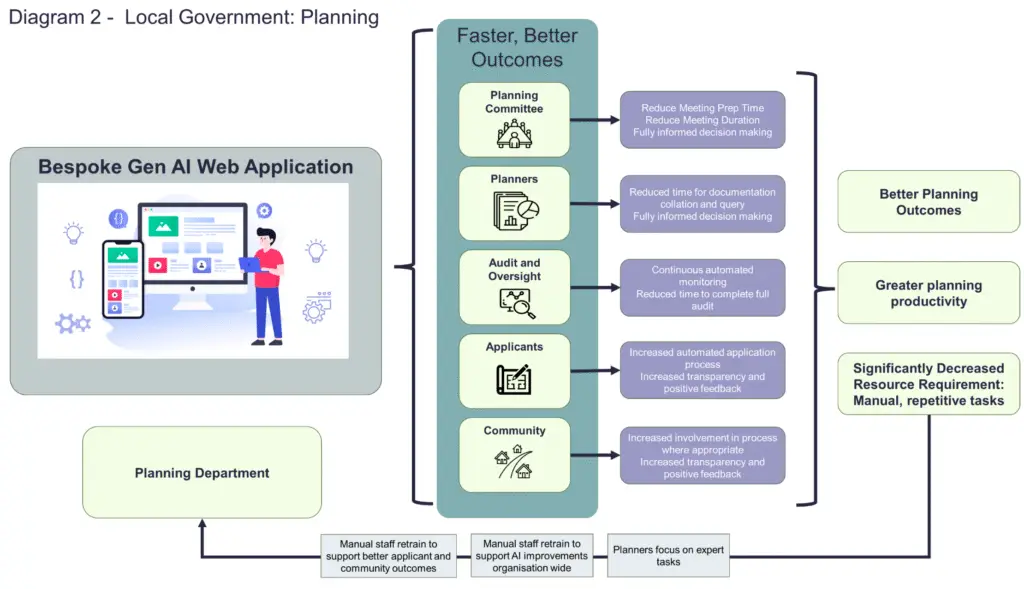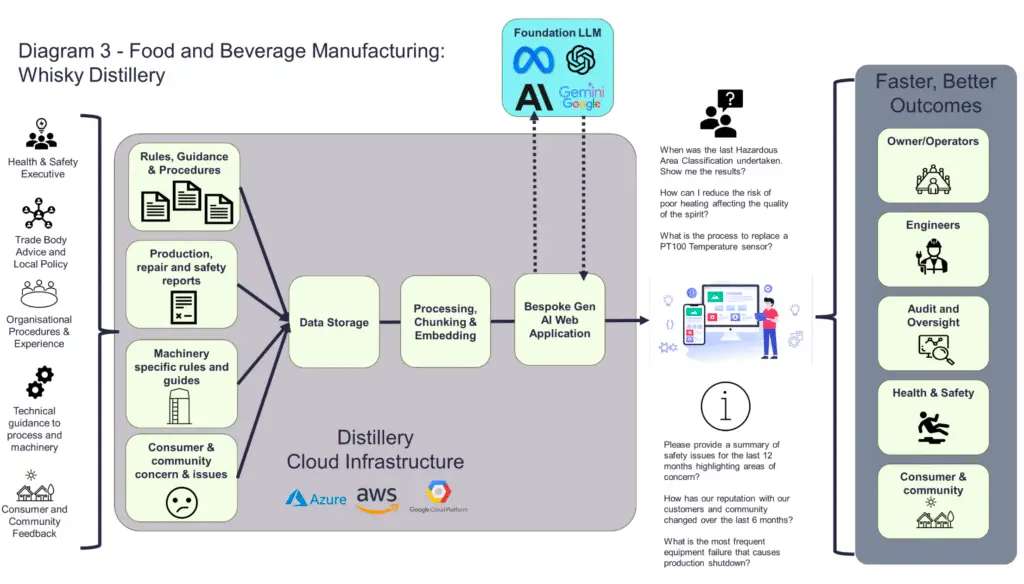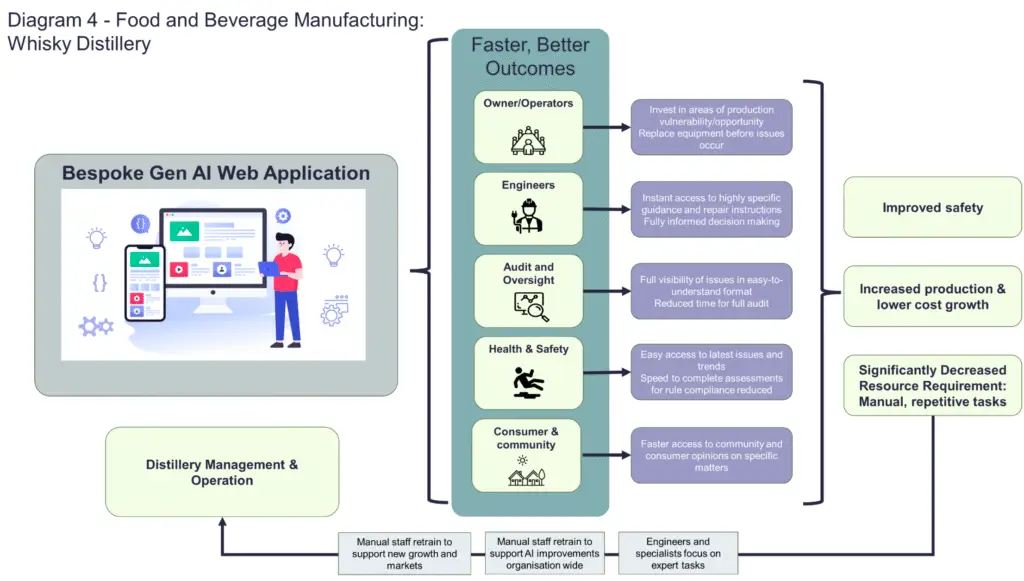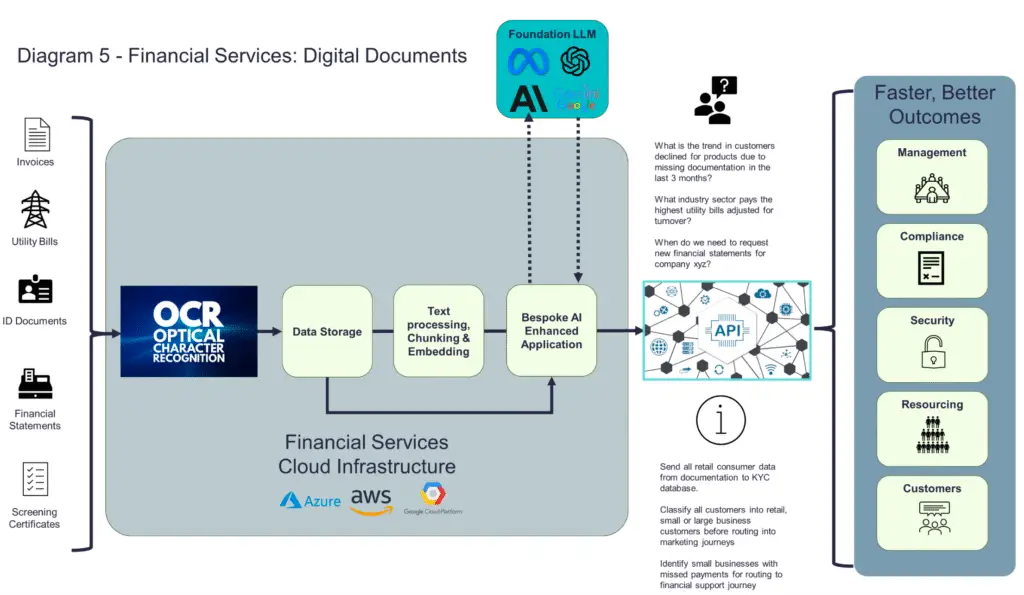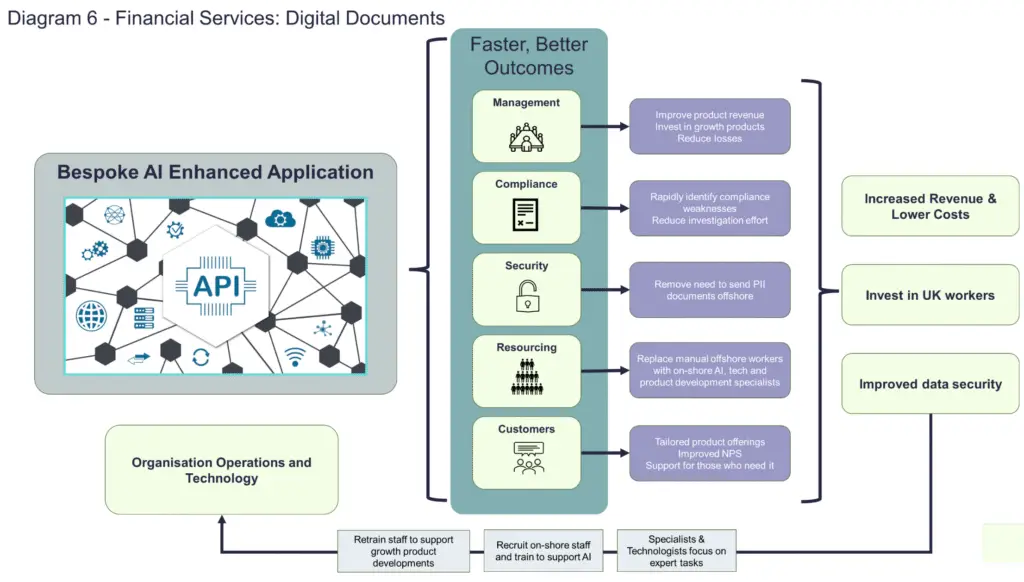AI is a crucial tool for enabling economic growth in the UK. Focusing primarily or exclusively on safety and regulation often results in the benefits of AI being downplayed by an often-underinformed atmosphere of fear amplified by the media. There are many ways AI can be deployed in UK SMEs and other organisations to reduce bureaucracy, improve operations and ultimately promote growth while retaining workers. Promoting real, growth focused use cases in detail demonstrates the opportunity AI provides for positive, economic impact.
Background
Discussion of AI in much of the media has recently been dominated by the politicising of some Big Tech companies alongside negative connotations for job security and safety concerns. Unfortunately, this has masked, and in some cases disparaged, the role AI has been demonstrated to have in promoting game-changing outcomes such as efficiency, productivity and growth in many sectors of the UK economy. Recent publication of the UK Government AI Opportunities Action Plan in combination with an increasingly vocal group of AI-experienced developers, users and educators in the UK is beginning to change the narrative to be AI for growth with high standards of safety built in – as we would expect for any other industry sector.
Here we present 3 Use cases of AI being deployed within UK SME sectors. These are presented in sufficient detail to explain how AI-enhanced systems function, how they may positively impact operational efficiency, productivity and growth across local government, manufacturing and financial services. Additionally, we have also presented the impacts on jobs and proposed how retraining and onshoring roles avoids potential job losses and demonstrates how AI can underpin employment, prosperity and economic growth. The use cases presented are based on an aggregation of both observed and proposed developments, underpinned by knowledge and experience of UK AI developers and industry experts. However, they are not intended as designs or solutions for individual organisations to develop, rather they are presented to demonstrate the benefits of AI and educate an audience of mixed technical ability.
Local Government: Planning
Planning departments across the UK face daily challenges from national issues such as housing shortages and balancing development needs with sustainability targets, through to local concerns such as paper-based bureaucratic processes, specific community concerns and shortages of qualified planners. Using a Large Language Model (LLM) based Generative AI (GenAI) approach known as Retrieval Augmented Generation (RAG) it is possible to input mixed format documentation including local planning policies; national policy & advice; community and individual views; environmental, social and economic impact studies and proposal designs from applicants to form a knowledgebase that can be accessed via a GenAI-enhanced web application. The ability to submit natural language queries as well as large information requests and get reliable, accurate and safe answers rapidly provides faster and better outcomes for planners, planning committees, auditors, planning applicants and communities. Diagram 1 in the appendix shows this process in detail.
The low-level benefits include reducing planning committee meeting preparation time, planners are able to make fully informed decisions and increased transparency for applicants and communities. Overall this approach delivers better planning outcomes, greater planning department productivity and significantly decreased resource requirement for manual, bureaucratic tasks. Planners will be able to focus on tasks that need their expertise thus increasing volume of application reviews and improving planning decisions. Staff previously employed to support tasks now removed may be redeployed into technical and non-technical AI improvement or to customer and community facing roles. Diagram 2 in the appendix displays in detail how GenAI processes can positively impact the productivity, community engagement and effectiveness of planning departments.
Food and Beverage Manufacturing: Whisky Distillery
Food and beverage manufacturing is a fast-growing sector in the UK. Specialist spirit production, including whisky, is a strong example of the UK creating superior quality products on the global stage. In whisky production, safety and productivity are dependent on experts having the right information available in real time and owners making the right investments to enable growth. Using RAG, a whisky distillery may create a knowledgebase including information from Health & Safety Executive; trade bodies; local policies; internal procedures and experience; technical guidance for machinery and consumer & community feedback. Access to a GenAI-enhanced web app containing this information can provide much improved and faster outcomes for Distillery owners/operators, engineers, health & safety officers, consumers and local communities. Diagram 3 in the appendix shows this in more detail.
Through fast and accurate identification of production issues and opportunities, owners can make targeted investments to improve safety and enable growth for lower cost. Repairs by engineers with instant access to machinery instructions and function history can be made faster and, again, at lower cost. Safety can be based on active avoidance of accidents rather than reactive thus improving working conditions and saving money. The workers undertaking roles reduced by GenAI can be retrained to support improvement and adoption of the new technology. Workers can also be redeployed to use their industry expertise to support new growth and expansion into new markets. Diagram 4 in the appendix displays how these benefits are realised in detail.
Financial Services: Digital Documents
Financial services are a foundation of the UK economy. The increase in digital banks, Fintechs, Insurtechs and specialist financial support entities has rejuvenated and positively reshaped the industry sector. However, obtaining critical information from paper and electronic documentation to support customer onboarding, product suitability and background checks, remains a significantly slow and resource-intensive process.
Using a combination of Optical Character Recognition (OCR) and RAG, documentation including invoices, utility bills, ID documents, financial statements and screening certificates can be automatically processed. Stored in a knowledge base enhanced with GenAI, text-based information can be used to deliver answers to natural language questions and all data can be accessed by operational systems and be delivered to processes supporting customer product journeys, compliance and marketing. This can provide faster and much improved outcomes for management, compliance, security, resourcing, and customers. Diagram 5 in the appendix displays this process in more detail.
Through AI-enhanced access to this information, executives will see improved product revenue, be able to invest capital in growth areas faster and reduce losses. Improved compliance with regulations, decreased risk of security breaches and better customer feedback and support are benefits that will be realised through consequent operational improvements.
As much of this manual data processing is currently sent offshore there is a significant impact on resourcing in financial services organisations who adopt this approach. As well as freeing specialists from manual tasks and retraining staff to support growing product areas, there is an opportunity to bring roles back onshore to the UK. These roles will mean recruiting new workers or re-training existing workers to support and improve the AI-enabled technology. Diagram 6 in the appendix shows these benefits in full detail.
Key messages
AI can be practically deployed across key sectors of UK SMEs to promote growth and help to strengthen the economy. Using AI to address common problems experienced by industry can not only make organisations more efficient but improve the quality of products and services they provide. The reduction of manual roles resulting from AI implementations can be mitigated through retraining to support this new technology and re-directing industry expertise to growth focused areas.
References
https://www.gov.uk/government/publications/ai-opportunities-action-plan
https://www.nvidia.com/en-us/glossary/retrieval-augmented-generation/
https://aws.amazon.com/what-is/ocr/#:~:text=Optical%20Character%20Recognition%20(OCR)%20is
Contributors
Lord Iain McNicol, Lord Kulveer Ranger, Gordon Baggott (AI Director, 4 Most Europe Ltd), Richard Davis (CEO, Inference Group Ltd), Colin Carmichael (Partner, 4 Most Europe Ltd), Mark Somers (CPO, Fifty One Degrees AI Ltd), Adam Leon Smith (Chair, AIQI Consortium)
Appendix
